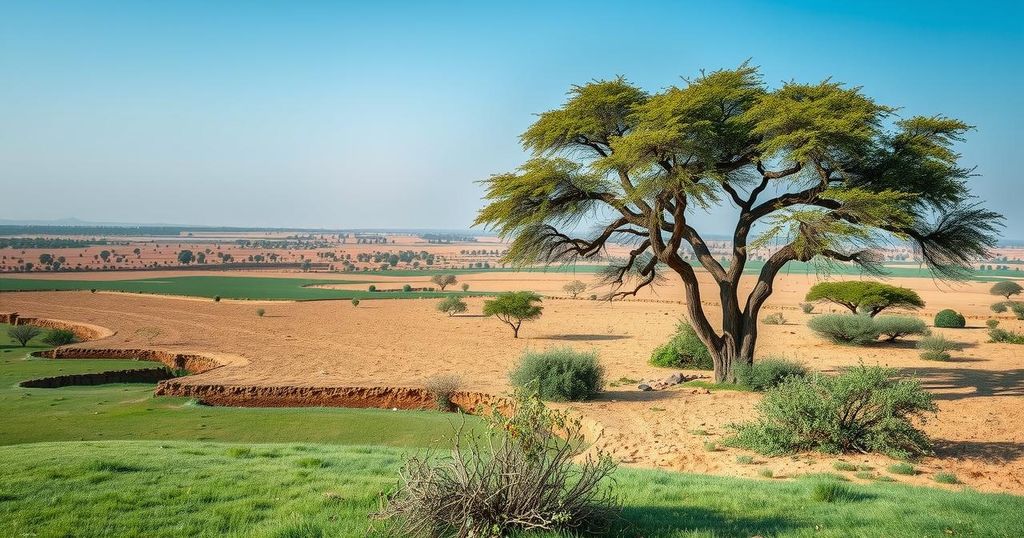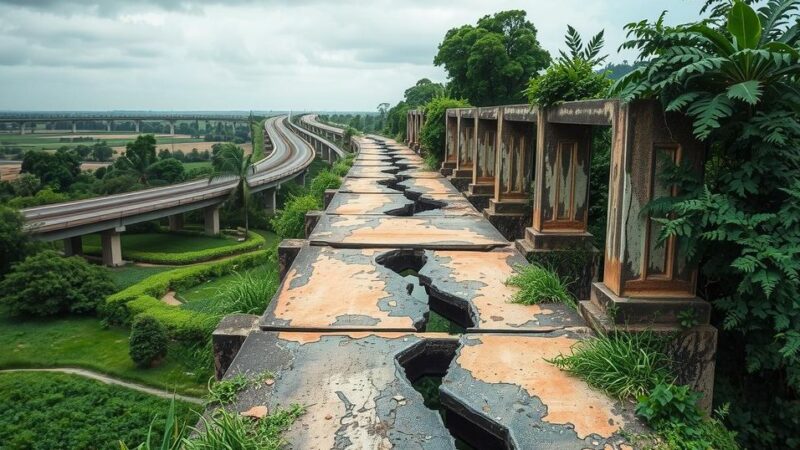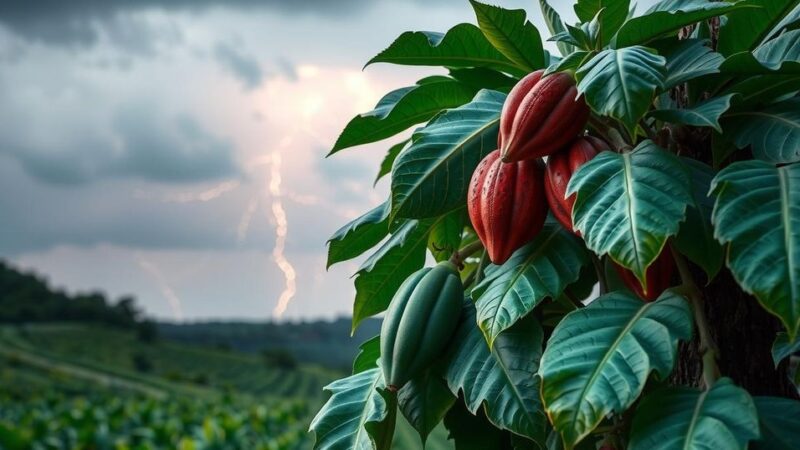Torrential rains during the Sahel’s rainy season have caused widespread flooding, displacing millions and damaging extensive cropland. Military coups in nations such as Burkina Faso, Mali, and Niger have disrupted governance and climate adaptation efforts. Political isolation from Western nations has restricted access to international climate finance, leaving communities ill-equipped to handle climate emergencies. Initiatives led by organizations like the OSS focus on empowering local communities and sustainable management amid ongoing political instability. There is an urgent need for strengthened governance and regional cooperation to improve resilience against climate change in the Sahel.
During the rainy season from July to September, torrential rains have wreaked havoc across the Sahel, resulting in extensive flooding that has displaced millions and submerged tens of thousands of hectares of essential cropland in Burkina Faso, Chad, Mali, Niger, Nigeria, and Sudan. The ongoing military coups in Burkina Faso, Mali, and Niger have disrupted governance structures and climate adaptation initiatives, while political isolation from Western nations limits access to international climate finance, leaving local communities grappling with extreme weather emergencies.
Organizations such as the Sahara and Sahel Observatory (OSS) advocate for empowering local communities through initiatives aimed at sustainable land and water management. Programs like Water User Associations and agroecology focus on harnessing local knowledge to bolster resilience against climate impacts. Despite the region’s potential for renewable energy and sustainable agriculture, progress is hampered by political instability, weak governance, and funding deficiencies.
Recent severe weather events across the Sahel have underscored the region’s increased vulnerability to climate change. Historical weather patterns have shifted dramatically, causing unprecedented rainfall that has led to widespread flooding and devastation. Families in numerous countries, including Niger, Mali, and Burkina Faso, have fought to salvage their possessions as rivers overflow and agricultural land is inundated.
In Mali, for instance, the Niger River has seen its most severe flooding in over fifty years, resulting in significant destruction. Reports indicate that nearly 7 million individuals across sixteen West and Central African nations are now impacted by these floods.
Housséini Ouedraogo, the Mercy Corps country director for Mali, emphasized the dire health risks posed by contaminated water and the continued disruption to travel and access due to damaged infrastructure. Recovery from such extensive flooding will be a lengthy and arduous process.
The political landscape in the Sahel further complicates the region’s climate adaptation efforts. The coups in military-led states like Niger, Mali, and Burkina Faso have led to isolation from Western support and resources that are crucial for climate resilience. While the European Union has provided some aid, wider issues such as weakened governance and limited access to funding continue to threaten the livelihoods of vulnerable communities.
The Sahel region, characterized by its semiarid climate and dependence on agriculture, remains one of the most affected areas by the looming climate crisis. “These threats undermine the livelihoods of millions of people, many of whom rely on subsistence farming and pastoralism,” stated Ibrahim Mohammed Bello, a Nigerian climate expert.
Unpredictable weather patterns marked by harsh droughts followed by intense rainfall pose further challenges. Military governments prioritize security concerns over environmental policies, consequently undermining climate adaptation efforts. For instance, the recent coup in Niger disrupted ongoing climate projects, leaving communities without vital support.
Conversely, countries like Chad and Mauritania, which have exhibited relative political stability, have implemented more cohesive climate policies that incorporate adaptation strategies into their development frameworks. However, these policies remain largely influenced by immediate security needs rather than long-term sustainability, as per Bello.
Political isolation and reduced international support compound the climate adaptation obstacles for junta-led nations. Sanctions from Western nations hinder their ability to secure funding for essential projects, exacerbating the impacts of climate change. In response, some regimes have redirected national budgets to focus on pressing adaptation initiatives, though these efforts often lack the necessary scale for effectiveness.
Junta-controlled countries have been compelled to forge regional alliances and seek support from non-Western partners, primarily concentrating on military cooperation rather than climate adaptation. As such, local communities remain at the mercy of inadequate resources and expertise. The Sahara and Sahel Observatory is working to help these countries access critical international climate funds, but legal and institutional challenges complicate this process.
Community-based adaptation measures are essential in the Sahel to build resilience using local knowledge and practices. One effective strategy is the establishment of Water User Associations, which empower communities to coordinate and manage shared water resources sustainably. Empowering local communities through these initiatives promotes environmental sustainability and meets the specific needs of residents facing the constant threat of water scarcity.
Experts underscore the importance of aligning local efforts with global climate frameworks. “Some countries are just getting familiar with concepts like carbon credits, while others are already implementing them,” noted Reuben Steve Muhanji, a climate expert from OSS. Although adaptation remains paramount, it should integrate technological innovations and traditional practices to ensure comprehensive solutions for communities in the Sahel.
The persistent political instability jeopardizes long-term climate resilience efforts across the Sahel. Weak governance often hinders project execution and detracts from significant international support. The OSS, while maintaining a politically neutral stance focused on climate adaptation, continues to encounter challenges due to donor hesitancy in engaging with sanctioned governments.
To overcome these hurdles, Sahelian countries are increasingly turning toward local adaptation strategies, emphasizing agroecology to promote sustainable practices that can withstand climate variability. Initiatives such as the interconnection of the West African Power Pool could enhance access to renewable energy, aiding Sahelian nations in transitioning from fossil fuels.
International institutions, NGOs, and development agencies could play pivotal roles in facilitating local adaptation strategies despite limited international engagement. Collaborative projects that prioritize community involvement can foster resilience while navigating the political barriers, enabling funding to align better with local necessities.
Experts highlight the need for robust governance frameworks to promote effective climate action. Enhancing regulatory capacity and utilizing data collection for informed resource management decisions are vital components. The interconnected challenges of political instability and climate vulnerability in the Sahel require a holistic approach that fosters regional cooperation to combat shared adversities. Muhanji articulated that collective solutions need to transcend borders as climate change issues affect neighboring countries as well.
The Sahel region faces daunting challenges due to climate change, compounded by political instability and military governance. Torrential rains have caused severe flooding, displacing millions and disrupting agricultural practices. Countries undergoing military coups struggle to adapt to ongoing climate crises due to weakened governance and reduced access to international support and funding, making local knowledge-driven initiatives increasingly necessary to enhance resilience. Regional cooperation and improved governance are critical for formulating effective climate action strategies in these vulnerable nations.
Original Source: news.mongabay.com






